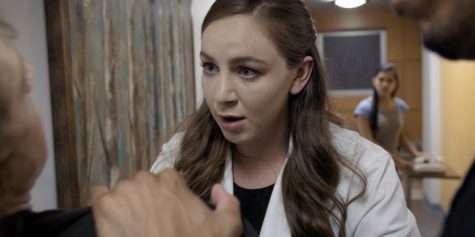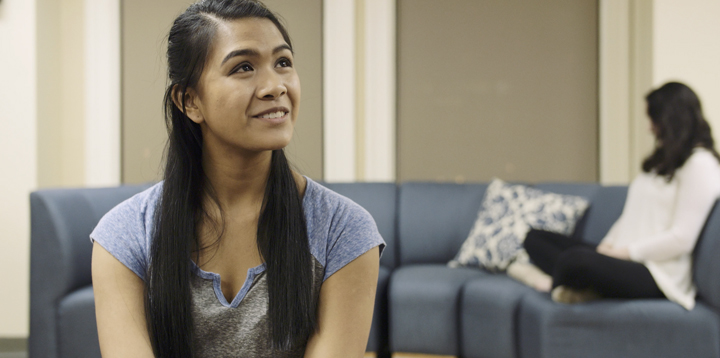Early on in the student-produced film “Ward,” the protagonist Andy, donning a red shirt juxtaposed against stark white walls, takes a handful of pills and immediately spits them out with regret.
Following the incident, Andy — a first-year college student played by Point Park University senior Alex Manalo — finds herself talking to a psychiatrist after she’s found in a catatonic state. Andy knows that she has symptoms of depression but is surprised when Dr. Jamison (Cassidy Davis), the psychiatrist who runs the psych ward where the film is set, recommends she check into the hospital.
The rest of senior Zack Williams’ film follows Andy’s stay in the psych unit as she deals with symptoms of depression and searches for happiness. During her stay, Andy meets Jackson (Cooper Marsh), a wisecracking patient who struggles to deal with his mental illness later in the film, contrasting with Andy’s story of self-improvement.
“Ward” premiered to about 150 people last Thursday during Pitt’s Mental Health Awareness Week in the Frick Fine Arts Building’s auditorium. Williams, a senior communications major, wrote, directed, edited and composed music for the half-hour short film. The film is personal for Williams, whose experience with mental illness shares similarities with his characters’.
Williams was diagnosed with Bipolar II in 2014 and spent time in a psych ward both before and after shooting the film, a treatment that worked for him. In “Ward,” he attempts to clear up the misconception that a mental hospital is a place for “crazy” people.
The ward in the film is quiet and calm — a far cry from the typical, overdramatized version depicted in movies like “One Flew Over the Cuckoo’s Nest.” Instead of wearing straitjackets and guzzling pills, Andy and the other patients play chess, draw and talk about their illnesses.
In an interview after the screening, Williams said, “The goal was to depict mental illness as normal as it can be depicted. There are times when everyone feels mental instability.”
Even Dr. Jamison’s character suffers an emotional breakdown during the film.
After one of her patients takes a step backwards in treatment, Jamison bursts into the stairway and breaks down in tears, silencing the room as the audience watched her crying. Sean O’Connor, who attended Thursday’s premiere, said that the way “Ward” portrayed her character gave him a new perspective on mental illness.
“It was interesting how they gave [Dr. Jamison] emotional vulnerability, too,” said senior Sean O’Connor.

“Ward” is the first major project Williams has directed. He and Stephen Kraus, the director of photography, said that they tried to make the film look as professional as possible. The duo added that they learned much of the technical side of the production during shooting, often using YouTube tutorials and how-tos found through Google searches.
Overall, their work shows — the film’s video and sound quality looks professional for a low-budget student production. However, their inexperience is noticeable sporadically due to mistakes with dubbed audio and minor continuity errors scattered throughout.
A more substantial issue is the film’s use of very short shots. The constant cutting away, especially in dialogue scenes, can become distracting. This is obvious in the scene between Andy and her friend in the psych ward — there’s a lot of tension between the two characters, but the short shots don’t allow the audience enough time to feel it.
Along with writing and directing, Williams also wrote and composed the film’s music. By writing moment-specific music, Williams’ music better captures the mood of a scene than non-original music could.
O’Connor, who has been involved in past UPTV productions, said the “Ward” crew’s production and marketing paid off.
“They put so much effort into legitimizing this. Stephen [Kraus] made a video production company and is working with cameras all the time,” O’Connor said, referring to Anthem Productions, which produced the film with UPTV. “The production quality is just a lot better than some [student] productions.”
Most of the actors — including Davis as Dr. Jamison — are Pitt students or recent graduates. All the leads deliver solid performances, but Cooper Marsh, playing Jackson, is the obvious standout. Marsh shows impressive range, making jokes in one scene before transitioning into serious conversations about mental illness in the next.
“Ward” is set primarily in the William Pitt Union, a familiar place for most Pitt students. But Williams and Kraus manage to give the building a different feel with their use of lighting and framing. They use soft lighting to create an inviting look that seems less threatening than the harsh glare of a hospital.
Jesse Irwin, host of “Pitt Tonight,” led a Q&A after the screening with Williams, Kraus and Pitt counselors Bobbi Jo Wendel and Megan Yetzer to discuss the film’s relation to mental illness.
“Mental illness is not something that can be summed up in a three word hashtag,” Williams said.
Williams’s statements — aimed at Pitt’s mental health education initiatives — come amidst recent student criticism of Pitt’s Counseling Center. After a psychiatrist from the center left last Friday with no replacement, a petition calling for a more effective mental health system surfaced on social media that garnered over 500 signatures online.
Student Affairs spokesperson Shawn Ahearn referred The Pitt News to a statement posted on Facebook announcing the University’s intent to fill two vacant psychiatrist positions and noting the Counseling Center’s recent addition of six new jobs.
Williams said the film was an attempt to depict mental illness as a complex issue that calls for substantial education.
Talking alone wasn’t working for Andy, but the treatment she received in the psych ward allowed her to deal with her illness and find some happiness. Even with some production shortcomings, the message was clear.
Toward the end of her treatment, Andy again stands alone in a white room, wearing a red shirt. She walks up to the mirror and smiles.


